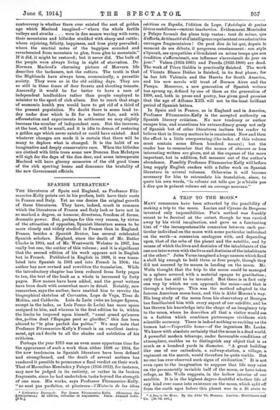SPANISH LITERATITRE.* THE literatures of Spain and England, as Professor
Fitz- maurice-Relly points out in his preface, both have their roots in France and Italy. Yet no one denies the original growth of these literatures. They have, indeed, much in common which the literatures of France and Italy lack or have not in so marked a degree, as humour, directness, freedom of forms, dramatic power. But, perhaps for this very reason, by virtue of the attraction of opposites, Spanish literature seems to be more closely and widely studied in France than in England. France, besides a Spanish Review, has several celebrated Spanish scholars. England, since the death of Mr. Butler Clarke in 1904, and of Mr. Wentworth Webster in 1907, has really but one, the author of this volume ; and it is significant that the second edition of his work appears not in English but in French. Published in English in 1898, it was trans- lated into Spanish in 1901 and into French in 1904; the author has now revised and rewritten the translation. While the introductory chapter has been reduced from forty pages to ten, the text of the book as a whole is increased by forty pages. New names have been added, and the great writers have been dealt with somewhat more in detail. Notably, new researches, says the author, have enabled him to rewrite the biographical sketches of Cervantes, Lope de Vega, Tirso de Molina, and Calderon. Luis de Leon (who no longer figures, except in the index, as Luis Ponce de Leen) has more space assigned to him, and whereas in the first edition he is, within the limits he imposed upon himself, "aussi grand qu'aucun des,pates dont l'Espagne pent se glorifier," this has been altered to "le plus parfait des poetes." We may note that Professor Fitzmaurice-Kelly's French is an excellent instru- ment, apt and docile to all the shades and subtleties of his criticism.
Perhaps the year 1913 was an even more opportune time for the appearance of such a work than either 1898 or 1904, for the new tendencies in Spanish literature have been defined and strengthened, and the death of several authors has rendered it possible to pronounce a final verdict on their work. That of Marceline Menendez y Pelayo (1856-1912), for instance, may now be judged in its entirety, or rather in its broken fragments, since he had undertaken tasks beyond the strength of one man. His works, says Professor Fitzmanrice-Kelly, "ne sent pas parfaites, et plueieurs—l'Hisforia de las ideas
• • Littera-aro Espagnolo. Par James Fitamaurice.Helly. (Histoires des kLitteratar.m.) So edition, refondue at augmentee. Paris : Armand Colin. Ed tea enlaces. en Rspafia, redition de Lope, l'Attiologia do peaty lirieoaeastellanos—reatent inachevees. Evidemment Menendez y Pelayo formait des plans trop vastes : tout de meme, qua d'efforts, de tenacite et d'intelligence representent °es admirables ouvrages fragmentaires I On pent dire de lui qua, depuis he moment de see debuts, it progressa constamment: son style s'epunrit, sea sympathies s'etendaient en meme temps que son erudition s'afformissait, son influence s'aceroissait de jour en jour." Valera (1824-1905) and Pereda (1833-1906) are deed. The work of Perez Grades is practically finished. The work of Vicente Blasco Ibanez is finished, in its first phase; for he has left Valencia and the Huerta for South America, and his new novels will treat of Buenos Aires and the Pampa. Moreover, a new generation of Spanish writers has sprung up, defined by one of them as the generation of 1898, and, both in prose and poetry, has given good promise that the age of Alfonso XIII, will not be the least brilliant period of Spanish letters.
In Spain and in France, as in England and in America, Professor Fitzmaurice-Kelly is the accepted authority on Spanish literary criticism. No new tendency or author escapes him, and sometimes his extraordinary grasp not only of Spanish but of other literatures inclines the reader to believe that in literary matters be is omniscient. Now and then the effect is a little overpowering (the index of this volume must contain some fifteen hundred names) ; but the reader has to remember that the names of obscure or less interesting writers are given, not at the expense of the more important, but in addition, full measure out of the author's abundance. Possibly Professor Fitzmaurice-Kelly will before long supply English readers with a fuller work on Spanish literature in several volumes. Otherwise it will become necessary for him to retranslate his translation, since, to quote his own words, "la refonte est telle qua je n'hesite pas k dire qua he present volume est un ouvrage nouveau."










































 Previous page
Previous page